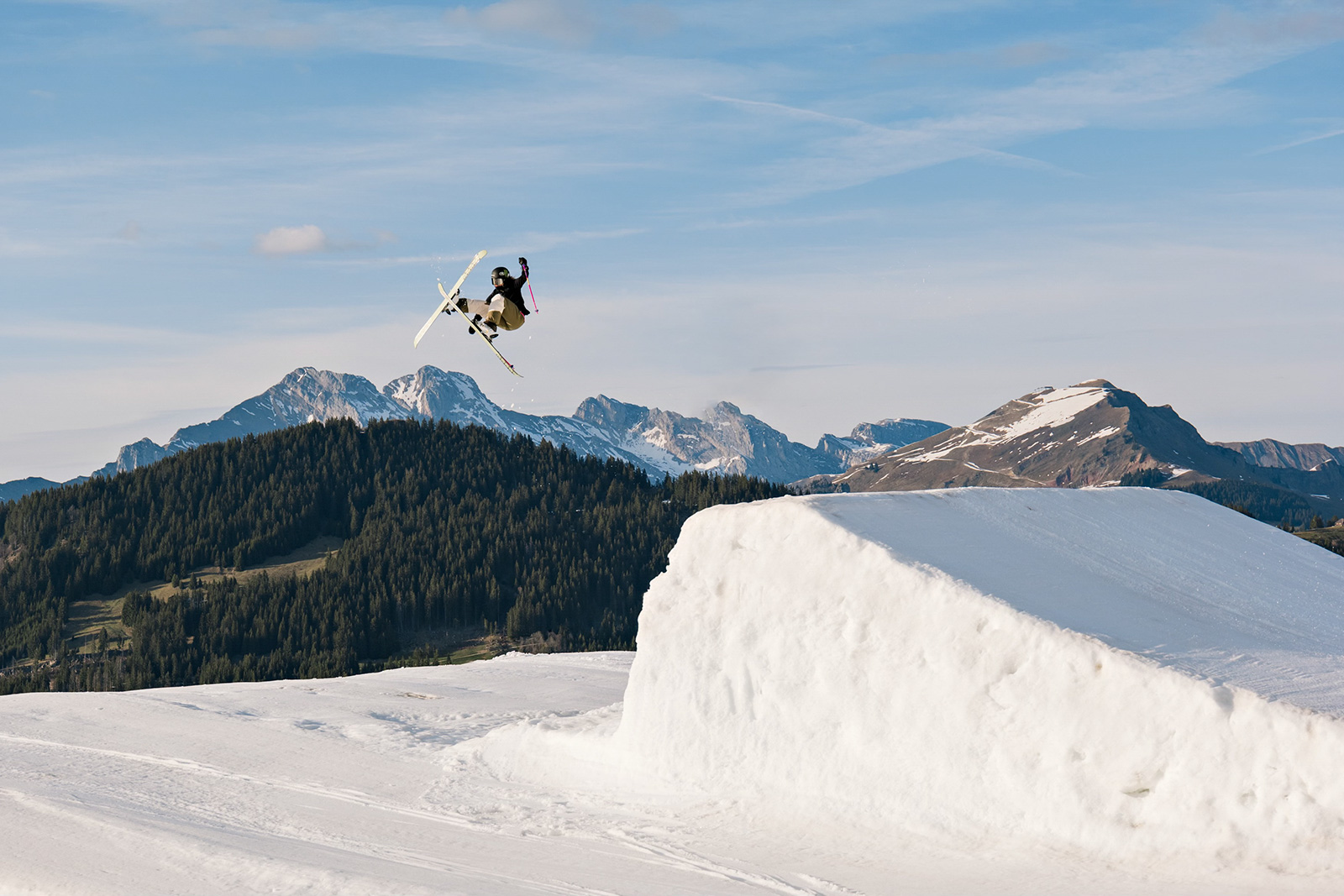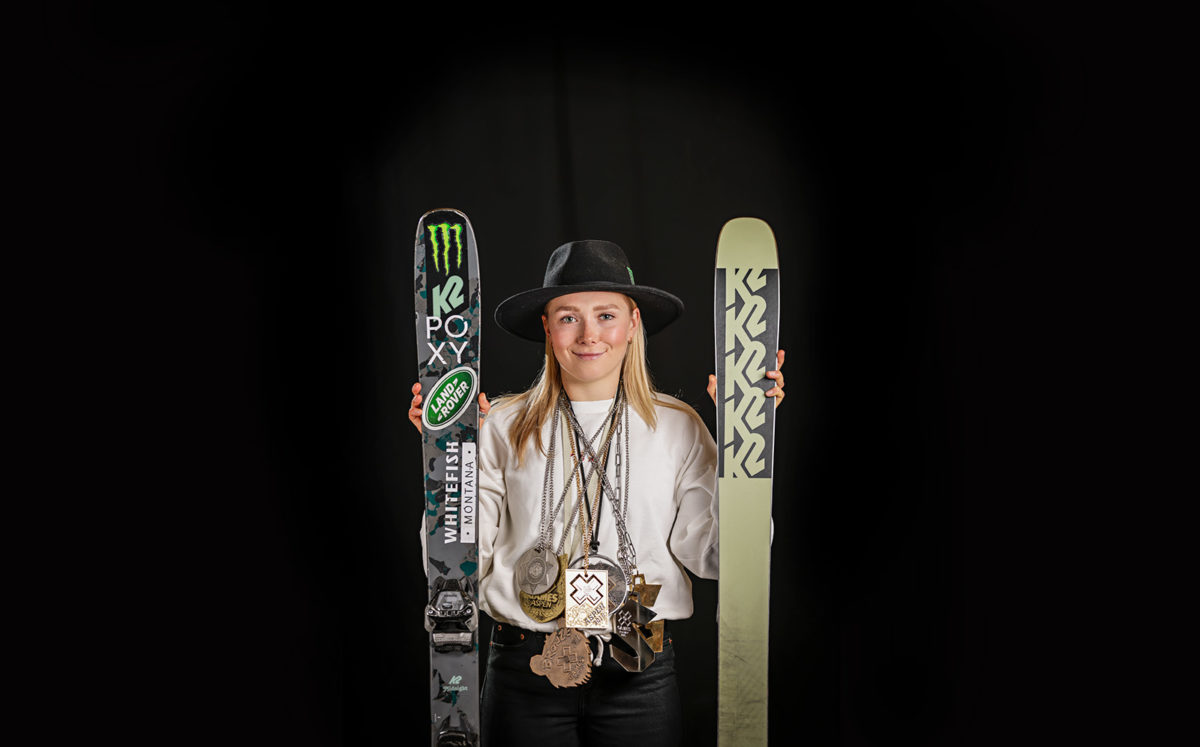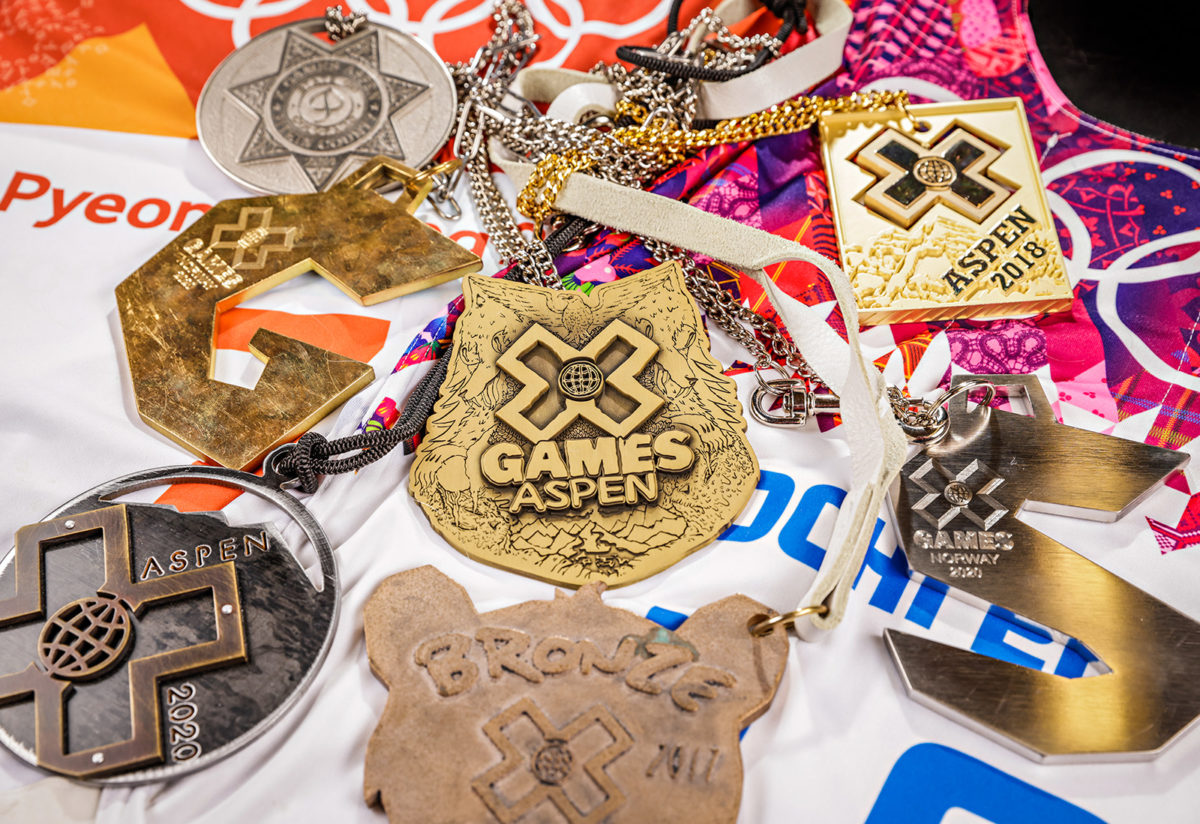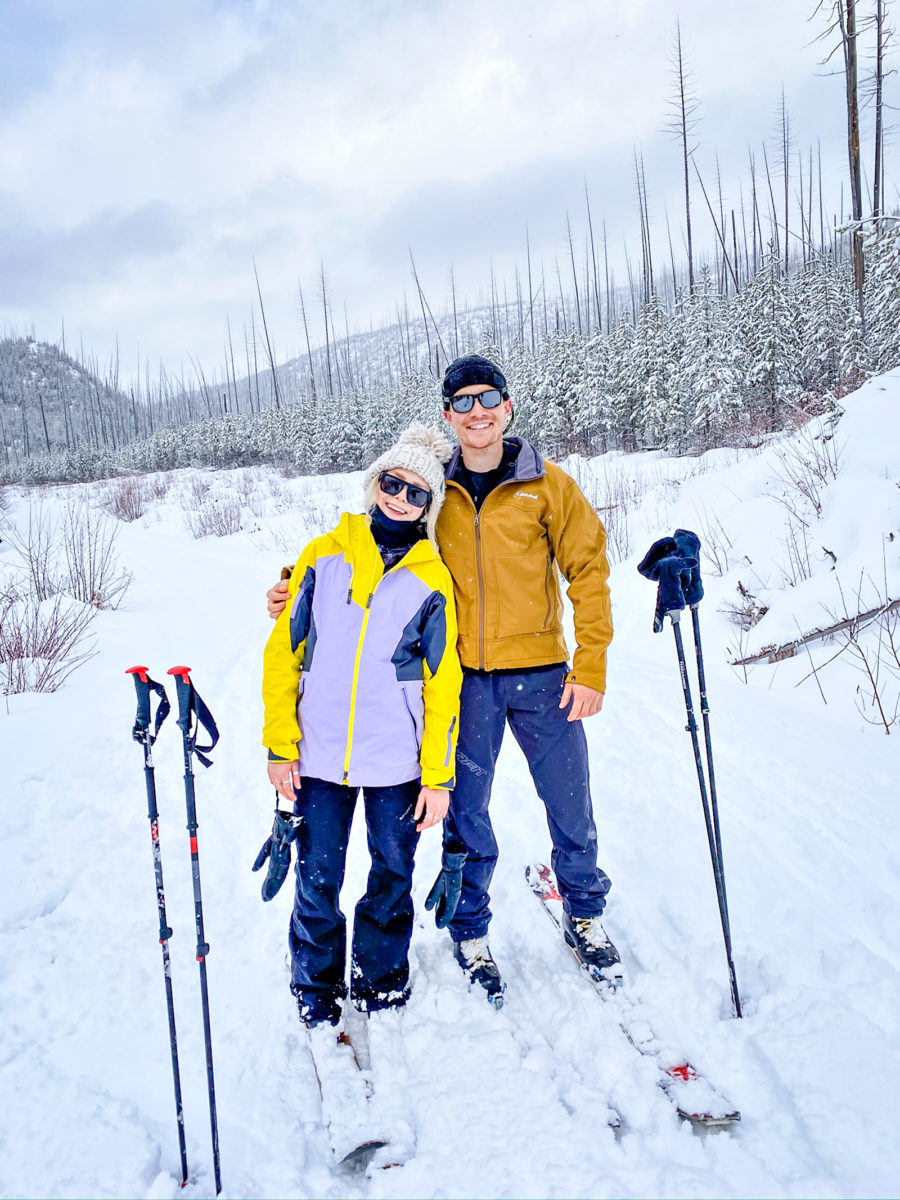Skiing Through Grief
Seven-time X Games medalist and Olympic freestyle skier Maggie Voisin has shifted her perspective on skiing, podiums, and life after her third Olympic Games, a series of injuries, and the loss of her older brother to suicide
By Maggie Dresser
In April 2019, Whitefish-born Olympic freestyle skier Maggie Voisin saw her physical therapist for a routine visit in Park City, Utah, where she was unexpectedly told to get an MRI scan on her left knee. She didn’t feel any pain. She hadn’t had any noteworthy crashes that season. But she followed her therapist’s advice and went in for a scan the next day.
Voisin’s left ACL was gone. She had likely been skiing without it for at least half of the season, and she went into surgery that spring with hopes of healing by the next ski season. She dedicated the rest of the year to rehabilitating her knee in Park City, where the U.S. Ski and Snowboard Team is headquartered, so she could work with her doctors, physical therapists and trainers instead of returning home to Whitefish, where she usually spends the offseason. She made a speedy recovery and was skiing seven months later, just in time for the 2019-2020 winter.
Despite the recent injury, Voisin skied very well. She competed five times before the pandemic hit in March and podiumed at every event. She won gold in slopestyle and silver in big air at the Norway X Games and she won bronze in slopestyle at the Aspen X Games in Colorado.
“I think because I had just rehabbed my knee, I was going into the 2020 season with no pressure,” Voisin said. “I just wanted to have fun that season and I think that was the catalyst of why I skied so well.”
The 23-year-old, seven-time X Games medalist was hitting her stride and her aspirations for her third Olympic Games in 2022 were within reach yet again — along with her dream of winning an Olympic medal, a goal that has so far eluded her.
After the pandemic shut down ski resorts across the nation for the remainder of the winter season in 2020, Voisin traveled to Mount Hood in July to ski when she tweaked her knee. She had another surgery in August to clean up scar tissue.
Four months later, Voisin headed home to Montana for the holidays. She drove up to Whitefish Mountain Resort with her older brother, Michael, to take her first post-operation turns on her home mountain, testing the waters before the X Games in Aspen at the end of January. Her knee felt great.
Voisin returned to Park City after the holidays and three days before she was supposed to leave for Aspen, she received a phone call from her dad.
She never made it to the X Games.
A month after skiing with her family on Big Mountain, Voisin’s 24-year-old brother died by suicide on Jan. 23, 2021.
As her father passed along the news that her brother was gone, thoughts of skiing and the X Games evaporated in an instant.
“That was the most intense moment of my life,” Voisin said. “I remember just being on my kitchen floor and it felt like my soul had left my body. I was just sobbing for hours. Skiing didn’t matter at that point. Nothing mattered besides my family.”
Instead of traveling to the X Games, Voisin and her boyfriend, Whitefish native and USA Bobsled athlete Gage Smith, went to Montana to be with her parents, twin brother and older sister. The Voisins hunkered down in Missoula to mourn Michael’s death in private, feeling the need to distance themselves from the small town of Whitefish as the grieving process began in earnest.
Two weeks later, the Voisins got on the chairlift early at Whitefish Mountain Resort on a rare bluebird day to spread some of Michael’s ashes on the mountain he loved.
“We were able to have this beautiful family closing after spending two weeks together,” Voisin said. “We all had to get back to life and go our separate ways and I decided at that point to go back to skiing.”
Voisin tried to ski at World Championships in Aspen two weeks later, but she wasn’t ready.
“Let’s just say, I tried to ski,” Voisin said. “I was so emotionally drained, and I couldn’t physically perform – especially in a sport where you’re putting your body on the line. I was an emotional wreck. I couldn’t get myself to do tricks. I was scared. My body was just depleted of everything it needed.”

After skipping World Championships, she made it to the Olympic qualifier a few weeks later where she placed fifth, but she decided to end her season early.
Skogen Sprang, the head coach for the U.S. Ski and Snowboard slopestyle and big air pro teams, has coached Voisin since she was a rookie on the team at age 14.
“It obviously impacted her,” Sprang said of Voisin’s brother’s death. “All of a sudden there are more important things going on than just skiing. She took the right steps to be with family and she did an amazing job. It took a ton of courage.”
Voisin spent the summer of 2021 at home in Whitefish with her family and focused on herself, following a friend’s advice to heal, grieve and be selfish.
“I really took that to heart,” Voisin said. “That whole summer, even though the Olympics were coming up, I just wanted to be home. I didn’t put pressure on myself to feel like I had to go out and train – I just wanted to be there for my family and with my family. I’m really grateful that I listened to her because it helped in those moments.”
As Voisin continued healing that summer, she thought a lot about the upcoming Olympics. She was heading into her third Winter Games after making the U.S. Olympic Team at age 15. She couldn’t compete during her first year in Sochi in 2014 after she broke her ankle during a training run and she just missed the podium in Pyeongchang in 2018 where she placed fourth in slopestyle.
Voisin wanted to medal in Beijing. But her brother’s death changed her perspective on her goals, and she reevaluated her priorities.
After Michael died, she said a lot of people who knew him reached out to describe the impressions her brother made on them, even through small acts of kindness. She heard stories about how he gave a mattress to a kid at school who didn’t have one, and how he stopped to help someone scrape off their windshield during a blizzard.
“It’s kind of crazy how much I learned about my brother once he passed,” Voisin said. “It all ties back into who I want to be and my life, but also my life as a skier and what really matters to me. So much shifted and changed for me since he passed away and I just want to be the best human I can be. I just try to be grateful for this career that I have and being able to do what I love every single day.”

Voisin continued to train in the Flathead that summer, climbing mountains with her dad in Glacier National Park.
The following December, she tweaked her right knee and took two weeks off from skiing before heading to the final Olympic qualifier in Mammoth, Calif., where she secured her spot on the U.S. Olympic Team to compete in slopestyle and big air.
“That was another hurdle right before the Olympics and I still felt like I was building myself up emotionally,” Voisin said. “But I was still so determined – I didn’t care if I was hurting and injured. Nothing was going to stop me from making this goal of going to the Olympics after everything that’s happened in the last several years.”
Many COVID tests later, Voisin made it to Beijing in 2022 after diligent isolation and precautions to enter the venue healthy. While Voisin had competed on-and-off since the pandemic started, this was the first time she was able to spend time off the slopes with her competitors and enjoy the camaraderie with athletes from around the world.
Aside from the pandemic, these Winter Games were different than the previous two. She put immense pressure on herself to medal in 2014 and 2018, but in 2022 she was grateful just to be there after the emotional and physical trauma she had endured in recent years.
“I just wanted to be proud of myself for being there,” Voisin said.
Voisin was not only proud of herself, but she was proud of her teammates and the sport of freestyle skiing. Aerials and big air events were added to the Winter Games in 2022, and there were more women in the sport who were at the top of their game. She’s excited to see the sport grow and flourish.
Voisin didn’t medal in Beijing. She placed fifth in slopestyle, missing an Olympic podium for the third time. But she brushed it off.
“She got fifth but landed one of her best runs she’s ever landed,” Sprang said. “Of course, I’m a little biased, but it could have easily had her in second place. She could have easily made the podium. All of those runs were amazingly progressive and considering the challenges she’s jumped through to get here, it makes it even more impressive.”
In Beijing, Voisin was able to look at the Olympics through a different lens.
“This year coming into the Olympics, it wasn’t about my result or a medal, it was about how far I had come,” Voisin said. “It was about where I had come eight years since my first Olympics, where I had come from four years since that Olympics, and about not getting down on myself for not having a physical medal at this one. An Olympic medal changes things but at the same time, it doesn’t define who I am as a person. At the end of the day, I ask myself what my career is about and what’s important to me – and what I really want is to inspire somebody and be a role model.”
Voisin started skiing when she was 3, alongside her parents, Truby and Kristin, her older sister Kelsey, and her brothers, Tucker and Michael.
Voisin was closest to her brothers and always strived to keep up with them, joining the freestyle team when she was 9 and moving to Park City to join the U.S. Ski Team at age 14 to pursue professional skiing. Despite leaving home as a young teenager, she remained close to her brothers, and she always looked forward to returning home to Whitefish.
Before Michael died two years ago, Voisin had never lost anyone close to her. To lose her older brother to suicide was a complete shock to her system. She doesn’t remember seeing any signs that he was struggling, and she said it felt out of the blue. Following his death, she kept asking herself what she could have done to help him, but through the grieving process, she realized she couldn’t play the “what if?” game.
Instead of blaming herself for his death or dwelling on what caused his pain, she’s redirected her energy to be a positive influence on other people. For now, Voisin is trying to spread positivity on a small scale, like posting something heartfelt for her thousands of followers on Instagram, or saying kind words to someone who’s having a bad day.
Voisin eventually wants to elevate suicide awareness on a larger scale, potentially through a nonprofit organization like the Nate Chute Foundation, a Whitefish-based nonprofit dedicated to suicide prevention.

“I’m still doing my own healing and right now I’m coming out of Olympic craziness,” Voisin said. “I’m deciding what steps and moves I want to take but also realizing in my day-to-day life that I can make a difference with small acts of kindness.”
In 2020, suicide was among the top nine leading causes of death for people ages 10 to 64 and was the second leading cause of death for people ages 10 to 14 and 25 to 34, according to the Centers for Disease Control and Prevention. Montana has consistently ranked in the top five in the nation for suicide rates and within 16 months in 2020 and 2021, the Flathead Valley saw at least eight teenage suicides.
“It raises concerns of what is going on?” Voisin said. “These are young kids who have the rest of their lives ahead of them. Why is this happening? What do we need to change?”
As she grieves, Voisin is also focused on her own mental health. After a stressful Olympic year, she’s taking a step back from competing.
With three competitions on the books for 2023 – X Games, Grand Prix at Mammoth and World Cup – she’s going to spend the remainder of the year skiing powder while working on different projects. She recently bought a snowmobile, and she plans to ski more in the backcountry, along with her childhood friend and professional big mountain freeride skier, Parkin Costain, as well as work with some film crews. In 2020, she released her first solo film called “Swiftcurrent,” and she’s hoping to launch other film projects in the future.
“I’m not going to put the pressure on myself to do all of these events and podium,” Voisin said. “I asked myself what’s going to be the most fun and rewarding thing for me right now? And that’s taking a little bit of time off this season, stepping out of my comfort zone and jumping into these new aspects of skiing that really excites me and inspires me.”
If you or someone you know is experiencing emotional distress or suicidal thoughts, dial 988 for the 24-hour suicide and crisis lifeline, a new code that routes to the National Suicide Prevention Lifeline.